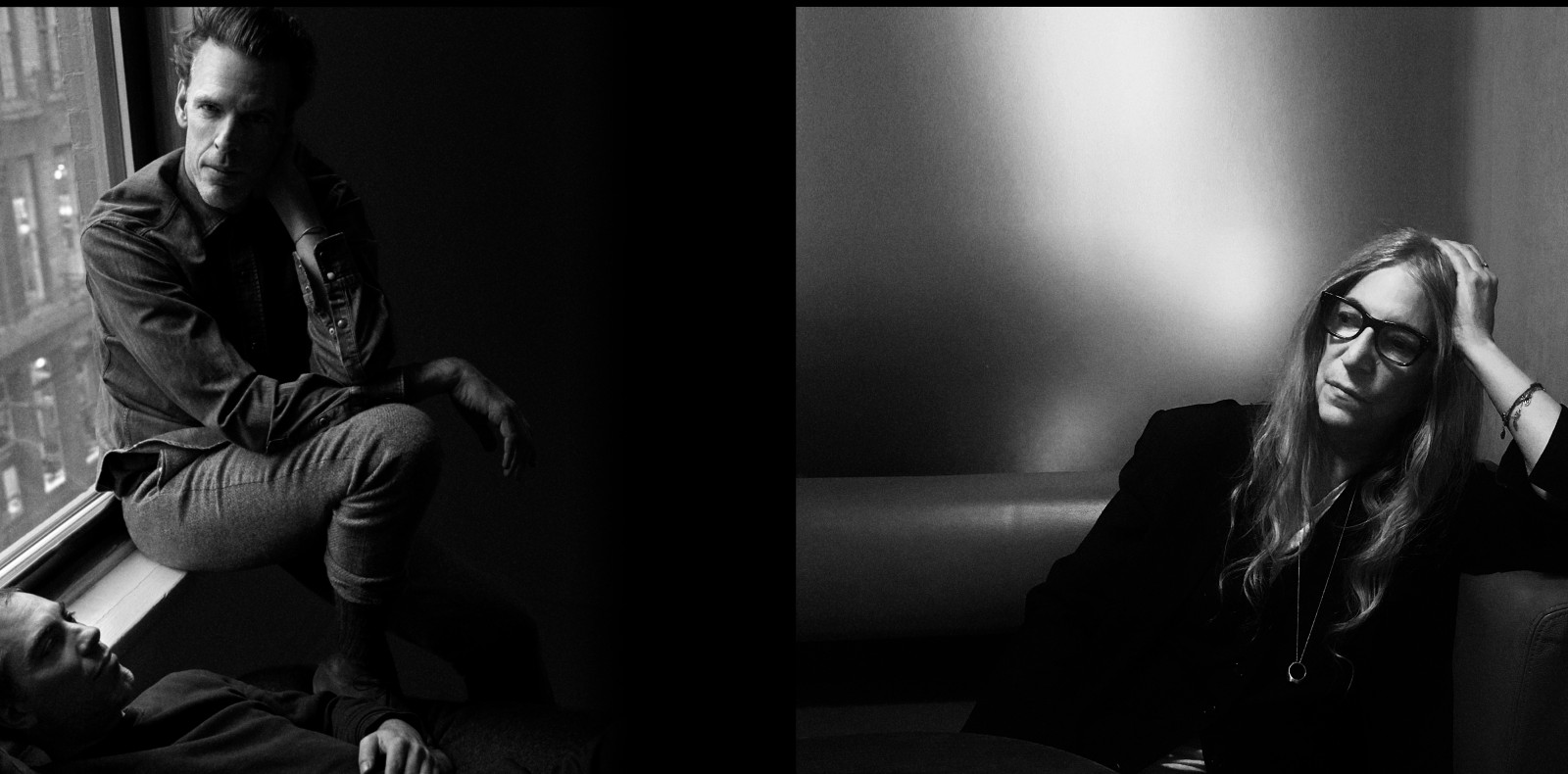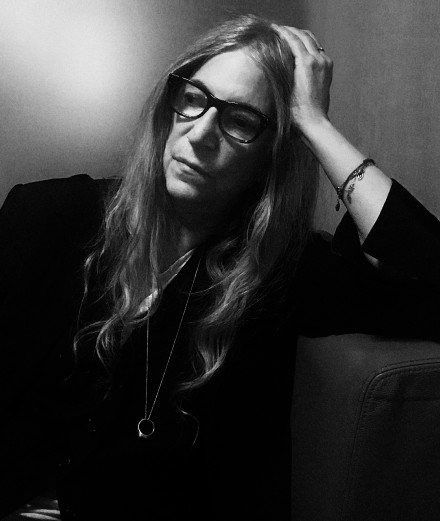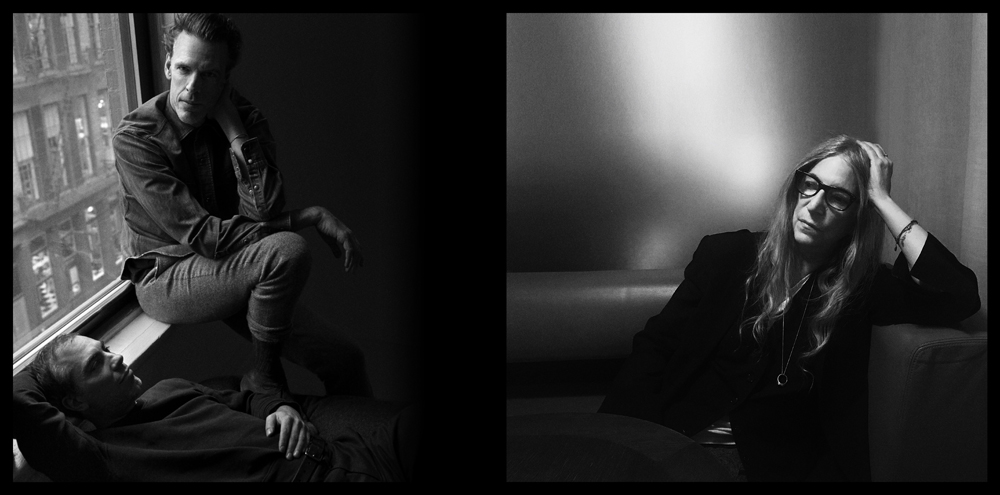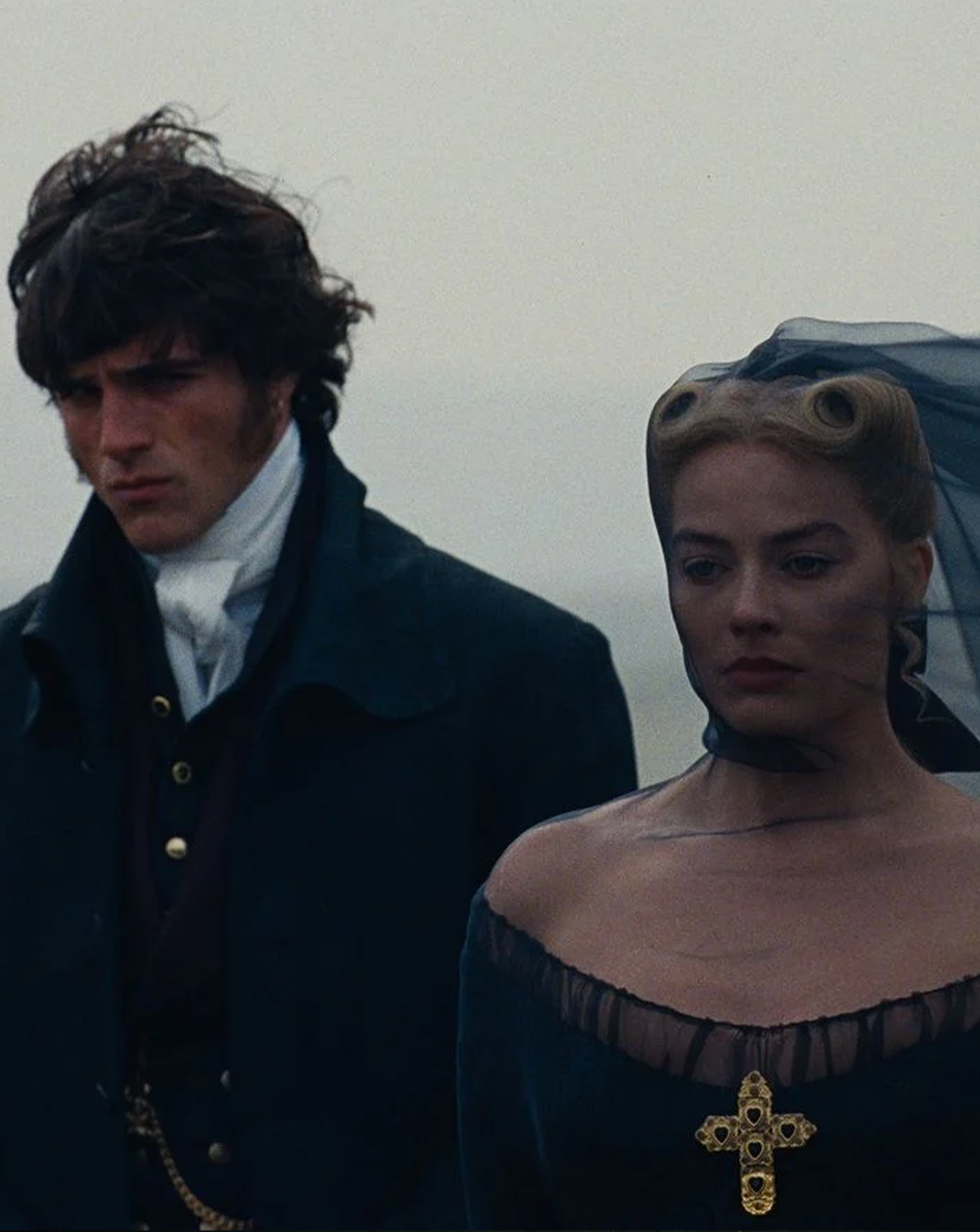
28

28
Interview with Patti Smith, for her exhibition with Soundwalk Collective at the Centre Pompidou
After releasing three albums together between 2019 and 2021, American rock icon and poet Patti Smith and New York-based musical and artistic duo Soundwalk Collective have created an immersive installation entitled “Evidence” at the Centre Pompidou in Paris. From October 20th, 2022, to January 23rd, 2023, visitors will embark on a sonic, poetic, and metaphysical journey in the footsteps of French poets Antonin Artaud, René Daumal, and Arthur Rimbaud, also known as “the man with soles of wind”. They will discover captivating musical creations featuring the voices of Charlotte Gainsbourg and Charlotte Rampling, as well as pictorial works by Patti Smith, and other objects brought back from Ethiopia, India, and Mexico, where the three poets went. Numéro has met the 75-year-old priestess of punk in the greatest privacy at the museum to talk about the power of poetry, climate change, and feminism.
Interview by Violaine Schütz.
Numéro: How did you and Stephan Crasneanscki, the New Y ork-based French artist and creator of Soundwalk Collective, meet?
Patti Smith: The funny thing is that this exhibition is about travelling and puts on display stones coming from the beautiful mountains of Mexico, landscapes from India and objects from Harar, a town in eastern Ethiopia. The two of us actually met while travelling. I was on a plane from Paris to New York, back from Morocco where I went to a festival celebrating the Beat Generation. Stephan was sitting next to me. I don’t usually like talking to people on the plane, but he was reading a book about the singer Nico. Nico was my friend. I had read a lot of books about her but not this one. So, I asked him about the book, and he told me that he was working on a musical and poetic project about Nico’s last days and hours of her life. I asked him: “Who’s going to read Nico’ s poems?” He replied: “I don’ t know yet. We’ll find someone.” Then I spontaneously said, “I’ll do it. She was my friend. I think I’ve understood her.” The next day I went to Stephan’s studio in New York, which was a short walk from my house, and we started working together. As we finished this album called Killer Road (2016), we thought: “We’re not going to leave each other like that. That’s too bad. Let’s do more together!” So, we embarked on a trilogy project about the French poets we loved – René Daumal, Arthur Rimbaud and Antonin Artaud. Stephan and I met in the sky, which is always a good start for a lasting collaboration.
What do you have in common?
Stephan had already started investigating Rimbaud. I discovered Rimbaud at the age of 15 and I have been reading him for over half a century. So, reading his poetry for this project was a job made for me, as much as experiencing it through his travels. We wanted to relive his trip to Harar, Ethiopia, through the Sufi songs lulled by the wind and the rain. That is how the record Mummer Love (2019) about Rimbaud came about. We wanted to do something different about the poet. We focused on the end of his life, which is less known than his early French years when he wrote Une saison en enfer (1873) and Illuminations (1886). Then, we decided to develop another project around Antonin Artaud, a poet we both liked and whom I started reading at 20. The poet has been widely celebrated as the handsome young man in the film The Passion of Joan of Arc (1928) and as the inventor of the concept of “theatre of cruelty” with his collection of essays The Theatre and its Double (1938). Yet, less is known about the peyote rituals he did in Mexico [the poet wrote a book on that subject, Les Tarahumaras, published in 1987, Ed.]. This fascinating part of his life is what we explored with Stephan.
And what about the poet René Daumal (1908-1944)?
René Daumal is less known compared to Artaud and Rimbaud, but what he wrote is so beautiful. As a young writer and poet, he used to be a real punk, a rock star. He told the Surrealists to go to hell, as he wanted to go further beyond their movement. To reach his goal and transcend the mere surrealist dreams, he took a lot of drugs to expand his consciousness. However, in his quest to disrupt all his senses, he had a very dangerous, intoxicating trip using tetrachloromethane [he originally used the substance to kill the beetles he collected, Ed.]. He learned some literary lessons from it that allowed him to dive into another world, but he also destroyed his lungs. Because of that, he couldn’t fight the tuberculosis he was diagnosed with in his thirties. He died too young, at the age of 36, just before World War II ended. Stephan and I didn’t focus on the young Daumal. Instead, we explored the most difficult and challenging part of his life, when he was trying to work while fighting tuberculosis and dreaming of climbing mountains in India, especially a sacred one he wanted to write about. Neither did he climb that mountain, because he died of his disease, nor did he finish his masterpiece, the adventure novel Mount Analogue (1952). Stephan and I decided to continue the journey for him, this physical, mental, and spiritual journey in the mountains.
We are witnessing a terrible climate crisis at the moment. How can music, art, and poetry have an impact?
This global crisis is probably the biggest one we have ever faced. Every action is important, from Greta Thunberg and youngsters marching in the streets, to people cleaning up public spaces and fighting against the government or big corporations. In this context, a poem or a song can help. A poem or a beautiful song alone won’t change anything, but the people reading or listening to them can make a change. Poetry, music, and art can inspire people to take action. Millions of people have to unite. We need a global movement. The other day, I saw a little girl picking up litter on a beach. She ended up cleaning the whole area on her own. So, imagine if a million people decided to clean the rivers. We have to roll up our sleeves and do our bit. So, if a poem can push us to do so, then God bless this poem. Before the pandemic, little Greta Thunberg was doing everything she could to start a movement. Millions of children marched in the streets everywhere, but then the pandemic set that fight back. Now we would like to start all over again, but we don’t have any time to lose. We have to do it now. Otherwise, we will walk alone on this earth, and we will no longer see the beautiful things it offers, such as gazelles crossing the plains.

How can a poem inspire people?
In 1986, me and my late husband Fred “Sonic” Smith [Frederick Dewey Smith, who died in 1994, was the guitarist of the band MC5 and his name inspired Sonic Youth, Ed.] wrote a poem called People Have the Power in 1998, and we made a song out of it. It was a song that people could use for their activism and to give them energy. Activism is not an easy task, it is hard, brutal, and even heartbreaking. My daughter, Jesse Paris Smith, is a climate change activist. Being an activist means constantly failing because you are lobbying big corporations and people who don’t really care about these issues or don’t even listen to you. Yet, it is so important to be heard. So, what can an artist do in all of this? Inspiring, exciting, inviting people to act. This little song that my husband and I wrote together has now travelled the world. This morning, someone sent me a video of young Iranian girls advocating for their freedom, because some girls are still fighting every single day only to have the right to let their hair fly free in the wind. This song gave them the energy they needed to demonstrate. Let me tell you the lyrics: “I was dreaming in my dreaming / Of an aspect bright and fair / And my sleeping it was broken / But my dream it lingered near / In the form of shining valleys / Where the pure air recognized / And my senses newly opened / I awakened to the cry / That the people have the power / To redeem the work of fools / Upon the meek the graces shower / It’s decreed the people rule / The people have the power.”
Do you have anything you want to share with us?
In the 1970s and 1990s, there was a majority of men present when I did interviews or small press conferences like this one. I am happy to see that today, there are almost exclusively women. Things have really changed. I think we are living in a very beautiful period of time because there are so many female artists, poets, scientists, and activists. Through books especially, we are rediscovering and valuing the women who have been unjustly forgotten in our history. I have just finished a small book called A Book of Days inspired by Instagram. It contains 365 photographs and, as on the social platform, each day corresponds to an image and a caption. During my research, I came across a young black scientist who lived in Hawaii in the 1920s. At that time, there was a big leper colony in Hawaii. She had discovered a treatment using the oil from the seeds of a tree to relieve the pain and allow patients to see their friends and family. Her name was Alice Ball, and she died at just 24 after a terrible chemical accident during an experiment. Her research was taken up by a professor who removed her name from the study to take full credit. It is only recently that people have discovered that she was the one who did the work.
Your exhibition features three men…
I don’t see them as men. I’m interested in their poetry first and foremost. I’m interested in women’s works as much as in men’s works. And I don’t think God cares about our gender. I am a humanist. I have a son and a daughter, and their rights are equal for me. I want my son to have a good life, just like my daughter. But I think it is great and very important that revolutionary efforts are made to give a voice to women and to the transgender community.
The “Evidence” exhibition by Soundwalk Collective & Patti Smith, from October 20th, 2022, to January 23rd, 2023, at the Centre Pompidou, Paris. A Book of Days (2023) by Patti Smith, to be published on November 1st by Penguin Random House.














